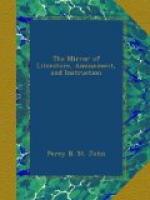“She must have been an irresistible creature, certainly, Mr. Tims,” said I. “Well, how did you come on?”
“Irresistible! but you shall hear, sir. I foresaw that, in soliciting the honour of the fair damsel’s hand, I should have much opposition to encounter from the rivalry of the three learned professions, to say nothing of the gentlemen of the sword and of the buskin; but, thinks I to myself, ‘faint heart never won fair lady,’ so I at once set up a snuff-box, looked as tip-topping as possible, and commenced canvassing.
“The second elite (for I know a leetle French, having for three months, during my apprenticeship, had the honour of frizling the head-gear of Count Witruvius de Caucason, who occupied private state-lodgings at the sign of the Blue Boar in the Poultry, and who afterwards decamped without clearing scores)—the second elite (for I make a point, sir, of having two strings to my bow) was Mrs. Joan Sweetbread, a person of exquisite parts, but fiery temper, at that time aged thirty-three, twelve stone weight, head cook and housekeeper to Sir Anthony Macturk, a Scotch baronet, who rusticated in the vicinity of town. I made her a few evening visits, and we talked love affairs over muffins and a cup of excellent congou. Then what a variety of jams and jellies! I never returned without a disordered stomach, and wishing Highland heather-honey at the devil. Yet, after all, to prove a hoax!—for even when I was on the point of popping the question, and had fastened my silk Jem Belcher with a knowing leetle knot to set out for that purpose, I learned from Francie, the stable-boy, that she had the evening before eloped with the coachman, and returned to her post that forenoon metamorphosed into Madam Trot.
“I first thought, sir, of hanging myself over the first lamp-post; but, after a leetle consideration, I determined to confound Madam Trot, and all other fickle fair ones, by that very night marrying Miss Diana. I hastened on, rushed precipitately into the shop, and on the subject—and hear, oh heaven, and believe, oh earth! was met, not by a plump denial, but was shown the door.”
“Upon my word, Mr. Tims,” said I, “you have been a most unfortunate man. I wonder you recovered after such mighty reverses; but I hope——”
“Hope! that is the word, sir, the very word, I still had hope; so, after ten days’ horrible melancholy, in which I cropped not a few heads in a novel and unprecedented style, I at it again, and laid immediate and close siege to the last and loveliest of the trio—one by whom I was shot dead at first sight, and of whom it might be said, as I once heard Kean justly observe in a very pretty tragedy, and to a numerous audience, ‘We ne’er shall look upon her like again!’”
“Capital, Mr. Tims. Well, how did you get on?”




